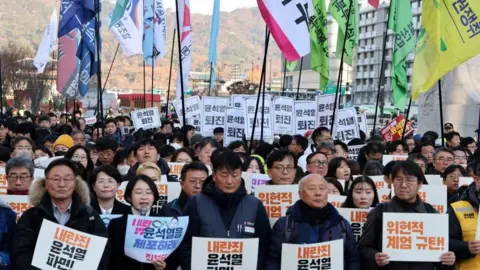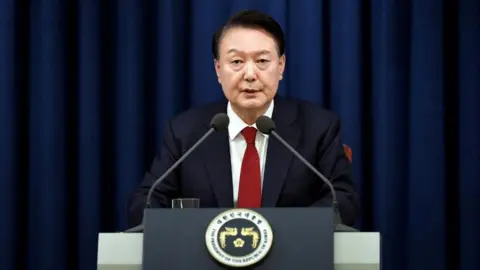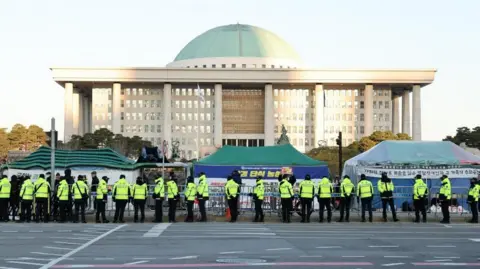South Korea opposition files motion to impeach President Yoon Suk Yeol
Vocabulary: 362, Words: 769

1South Korea's opposition lawmakers have begun impeachment proceedings against President Yoon Suk Yeol over his failed attempt to impose martial law.
2The country woke up to an uncertain reality on Wednesday after a night of unprecedented scenes which saw Yoon unexpectedly impose martial law, 190 lawmakers gathering to vote it down, and a sudden reversal of the decision.
3After tabling the impeachment motion, South Korea's main opposition Democratic Party condemned Yoon's initial martial law declaration as "insurrectionary behaviour".
4Parliament will have to vote on whether to impeach Yoon by Saturday.
5"We can no longer allow democracy to collapse. 6The lives and safety of the people must be protected," said Kim Yong-jin, a member of the Democratic party's central committee.
7The Party also said it wants to charge Yoon with "crimes of rebellion".
8It named Minister Kim Yong-hyun and Interior Minister Lee Sang-min as "key participants" of the martial law declaration, saying it also wanted them charged alongside Yoon.
9Schools, banks and government offices in Seoul are operating as usual, but protests have continued throughout the city.
10"Arrest Yoon Suk-yeol," some angry citizens chanted as they filled the streets.
11South Korea's largest labour group, the Korean Confederation of Trade Unions, vowed on Wednesday to go on indefinite strike until the president steps down.

12Wednesday's announcement comes after dramatic scenes overnight, which saw some opposition lawmakers break barricades and climb fences to get to the voting chamber.
13Hundreds of troops stormed the parliament after Yoon declared martial law, as military helicopters circled the site.
14Thousands of protesters arrived at the gates of the National Assembly, as 190 lawmakers evaded police lines and forced themselves inside to vote down the order.
15His second announcement - that he was reversing his earlier order - was met with cheers from protesters outside South Korea's parliament.
16On Wednesday, Yoon's senior aides, including chief of staff Chung Jin-suk and national security adviser Shin Won-sik, tendered their resignations. 17Whether their resignations will be accepted is unclear.
18The presidential office has defended the initial decision to declare martial law as "strictly within [the country's] constitutional framework". 19It said on Wednesday that the annoucnement was timed to "minimise damage" to the economy and people's lives.
20How do impeachments work in South Korea?
21Once an impeachment bill is proposed, two-thirds of South Korea's 300-member National Assembly must vote to impeach - that translates to at least 200 votes. 22The vote must take place within 72 hours.
23Once the impeachment is approved, the president will immediately be suspended from office, while the prime minister becomes acting president.
24A trial will then be held before the Constitutional Court, a nine-member council that oversees South Korea's branches of government.
25If six of the court's members vote to sustain the impeachment, the president will be removed from office.

26Have other South Korean presidents been impeached?
27In 2016, then-President Park Guen-hye was impeached after she was charged with bribery, abusing state power and leaking state secrets.
28In 2004, another South Korean president, Roh Moo-hyun, was impeached and suspended for two months. 29The Constitutional Court later restored him to office.
30If Yoon resigns or is impeached, the government will have to hold an election within 60 days for the country to vote for its new leader, who will start a fresh five-year term.
31South Korea's history with martial law
32Under South Korea's constitution, the president has the authority to declare martial law during war, armed conflict, or other national emergencies.
33The last time martial law was declared in the country was in 1979, when the country's long-time military dictator Park Chung-hee was assassinated in a coup.
34A group of military leaders, led by General Chun Doo-hwan, declared martial law in 1980, banning political activities and arresting dissidents.
35Hundreds of people died amid a crackdown on protesters before martial law was lifted in 1981.
36Martial law has not been invoked since South Korea became a parliamentary democracy in 1987.
37Yoon pulled the trigger on Tuesday, saying he was trying to save the country from "anti-state forces".
38But some analysts have described the move as his bid to thwart political opposition.
39Yoon has been a lame duck president since the opposition won a landslide in the country's general election in April this year - his government has not been able to pass the laws it wanted and has been reduced instead to vetoing bills the opposition has proposed.
40The president's approval ratings have hit record lows of 17% this year, as he and his wife Kim Keon-hee have been mired in a spate of scandals.
41Additional reporting by Woongbee Lee in Seoul and Frances Mao in London
from BBC